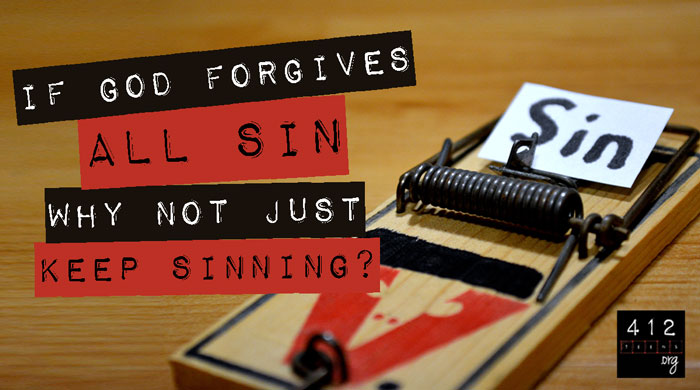


When we are born, we are born into a sin nature. That means that we are literally unable to not sin and be perfect. When Adam and Eve fell from grace in the Garden of Eden by eating fruit from the tree that God told them they could not eat from, they introduced sin into the world (Genesis 3:6-7). Now, every human being since them has had a curse upon them. Because of this, we are helpless in our pursuit of a right relationship with our Creator, which is what we are ultimately created for.
The good news however, is that God sent His Son, Jesus, into the world to live a perfect life, and then die on the Cross to forgive us of all of our sins. Those who believe this to be true will have a right relationship with God restored and be given eternal life with Him. Once we accept Jesus' death, burial, and resurrection as the payment for our sins, and confess our sins to God, we are saved and forgiven of all our sins. This is great news, right? (Learn more about salvation here: How can I be saved?)
Well, unfortunately we still get ourselves tangled up in sins every day. And if we're honest, we sometimes find those sins fun, don't we? So if all of our sins are forgiven anyway, does that mean we have a "license to sin"? Why don't we copy the homework of a really smart friend, or lie to our parents to get out of something, or stop worrying about talking to God? God will forgive us, right?
Let me suggest three reasons that, even though we are forgiven, we should not still continue to sin:
Yes, sin will always be at the door of our lives, trying to get its way in. Even the apostle Paul struggled with sin (Romans 7:7-25), but we have the good news that as Jesus died for our sins, so also we have died to sin with Him, and have been raised to life with Him. We are not slaves to sin anymore. Sin is not our master; God is our master. Sin harms us; God helps us.
When we truly surrender and choose to make life choices based on God's will, we grow our love for Him more and more. Perhaps one day, we won't even want to sin anymore. Perhaps at some point, we will come to hate sin, just as God hates sin (Psalm 5:5). Yes, we will always struggle with sin, but as long as we are struggling, that means that we haven't given in to it. Intentionally sinning without remorse or a desire to repent is not something one who has truly accepted Christ will want to do. God will forgive us when we sincerely repent. That's true grace for true sin. I'll leave you with this thought from the apostle Paul:
"What shall we say, then? Shall we go on sinning so that grace may increase? By no means! We are those who have died to sin; how can we live in it any longer? Or don't you know that all of us who were baptized into Christ Jesus were baptized into his death? We were therefore buried with him through baptism into death in order that, just as Christ was raised from the dead through the glory of the Father, we too may live a new life...
"For we know that our old self was crucified with him so that the body ruled by sin might be done away with, that we should no longer be slaves to sin—because anyone who has died has been set free from sin...Therefore do not let sin reign in your mortal body so that you obey its evil desires...For sin shall no longer be your master, because you are not under the law, but under grace." —Romans 6:1-4, 6-7, 12, 14


Our sin nature makes it literally impossible to NOT sin. But that isn't an excuse to keep sinning whenever we wish to. There's a reason why God doesn't want us to sin. Sin damages our relationships with others, ourselves, and with God. Jesus paid the penalty for all our sins so that we no longer slaves to our sinful ways (Galatians 5:1; 2 Corinthians 3:17), and we can honor His sacrifice by choosing holiness over sinfulness. We can CHOOSE to resist sin—even if we are tempted by it. Intentionally sinning, without remorse or desire to repent, is to insult Jesus' sacrifice. Yes, God will always forgive us when we sincerely repent, and that's a true grace we can be thankful for.

Stephanie is a 21-year old with a passion to see believers grow and become passionate in their relationship with the Lord. She is a lover of sweat tea, sunshine, and the freedom that comes from Christ. In her free time, she can be found singing, playing guitar, writing or jamming out to Hawk Nelson, Phil Wickham, and worship music. Her dreams are to become a worship leader and a published author, while living a life full of fun and joy that comes from the Lord.
